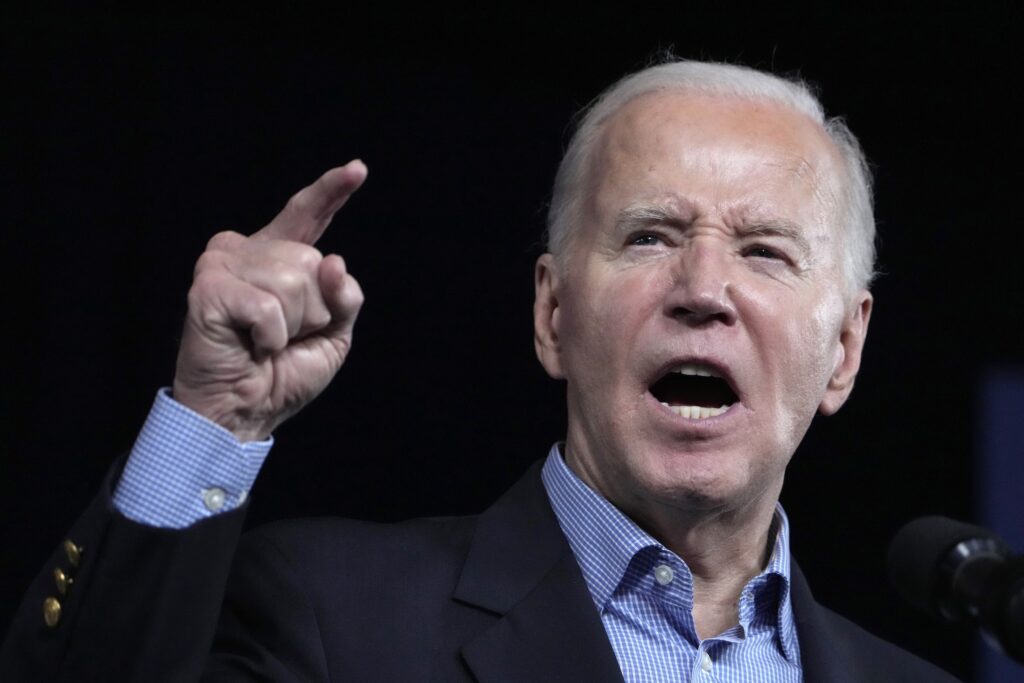
President Joe Biden‘s relationship with Israeli Prime Minister Benjamin Netanyahu is coming under increased pressure from his reelection campaign, raising fears of a rupture between the two leaders at a critical time in Israel’s war with Hamas.
When Secretary of State Antony Blinken’s team unveiled a budget request that contemplates $3.3 billion of aid to Israel, it could have appeared as though it was “business as usual” in the relationship.
“The president’s request … maintains our long-standing investments to support key partners in the Middle East and North Africa and their security against growing violence by extremists and Iran-linked malign actors,” Rich Verma, Blinken’s deputy secretary for management and resources, told reporters on Monday.
However, the cash request came after an overt surge in tensions in the relationship between Biden and Netanyahu, which is at the heart of America’s strategy in the world’s most volatile region and, as such, carries more than the usual symbolic significance.
Unveiled just days after a State of the Union address — in which members of his party wore keffiyehs, using the prime-time event to show solidarity with Israel’s Islamist enemies — that set the stage for a weekend of an unusual public dispute between Biden and Netanyahu, it points to a paradoxical continuity at the level of U.S.-Israel policy amid a dispute that officials and observers in both countries attribute in part to American political pressures in an election year.
“So, the rhetoric, it’s now stronger than before the weekend,” a senior European official based in Israel told the Washington Examiner. “I think, even domestically, Netanyahu or his allies, they are trying [to] point out that Biden, he’s forced to go this way because of the domestic considerations.”

The high death toll in Gaza, where Hamas-run institutions provide the most widely used civilian casualty figures, and the undeniable suffering of civilians trying to survive the war has sparked an intense backlash from Biden’s political Left.
Biden’s team has made an apparent effort to mitigate that pressure through a series of thinly veiled signals of displeasure with Israel’s conduct of the war, but the president cast a harsher light on the dispute in his State of the Union address and in a hot-mic conversation after the speech in which he forecast a “come to Jesus” conversation with Netanyahu.
“I’m not familiar with that term, even though Jesus wasn’t born that far away from here,” Netanyahu responded Monday in an interview with Fox News. “If it means having a heart-to-heart conversation, we’ve had that plenty of times of the 40 years that I’ve known Joe Biden, and then over the 12 or 13 conversations that we’ve had since the beginning of the war. But ultimately, I’m the prime minister of Israel. I’m responsible for the security and future of the Jewish state.”
Netanyahu also warned in the interview that Hamas is exploiting increasing amounts of “daylight” between Biden’s administration and the Jewish state.
Just days earlier, Biden took the unusual step of calling Netanyahu’s judgment into question in a public forum by airing his belief that Netanyahu is “hurting Israel more than helping” it.
“He has a right to defend Israel, a right to continue to pursue Hamas, but he must, he must, he must pay more attention to the innocent lives being lost as a consequence of the actions taken,” Biden told MSNBC on Saturday. “In my view, he’s hurting Israel more than helping Israel by making the rest of the world — it’s contrary to what Israel stands for. And I think it’s a big mistake.”
Biden further fed the controversy by implying he opposes an Israeli attack on Rafah, the southern Gaza city where the remaining Hamas battalions are intermingled among the estimated 1.4 million civilians who fled there, seeking haven from the Israel Defense Forces’ campaign in the north.
“It is a red line,” Biden told MSNBC. “I’m never gonna leave Israel. The defense of Israel is still critical. So there’s no red line [where] I’m going to cut off all weapons so they don’t have the Iron Dome to protect them. But there’s red lines that, if he crosses — we cannot have 30,000 more Palestinians dead as a consequence of going after [Hamas].”
As a result of the public trading of barbs, the relationship between the two leaders appears at an impasse.
Yet Blinken’s team acknowledged that the administration does not oppose the idea of an Israeli attack on Rafah in principle but wants the IDF to develop a viable “humanitarian assistance plan” before doing so.
“We have said what we need to see to be able to support a Rafah operation, and that is a credible and implementable humanitarian assistance plan,” State Department spokesman Matthew Miller told reporters Monday. “The Government of Israel has said that they will implement a humanitarian assistance plan. … Let’s wait and see what it is that they come up with.”
That plan hasn’t been unveiled because the Israelis don’t have one yet, another analyst suggested.
“The Israelis have hit pause,” Foundation for Defense of Democracies Senior Vice President Jonathan Schanzer told the Washington Examiner. “They still have not solved for the 1.4 million in Gaza, they’ve not yet figured that out. And they haven’t figured out how to get more aid in, in a way that feels satisfactory to the Israelis.”
Israeli officials have held off a large-scale assault on Rafah in recent weeks, in part to buy time for negotiations over a temporary ceasefire deal that would involve the release of Israeli hostages held by Hamas in exchange for Palestinian inmates in Israeli prisons.
CLICK HERE TO READ MORE FROM THE WASHINGTON EXAMINER
“If the Israelis went in [to Rafah] against the advice of the U.S., I could imagine that you would see this kind of rhetoric from Biden,” Schanzer said. “Right now, they’re simply having a debate … and there’s something really weird about this. And I do not think this reflects a full-on battle at the executive level. This seems like something else. And, if you ask me, it looks like a drama that is, you know, being put on for the sake of [a domestic American political] audience.”
The European official agreed — at least for now. “This is a developing story,” the official said.







